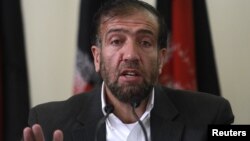ISLAMABAD, PAKISTAN —
Afghanistan’s Election Commission says the country’s next presidential election will take place April 5, 2014. That vote will set the course for Afghanistan as international troops leave the country after more than a decade.
Afghan elections officials said Wednesday that the 2014 ballot will be open to everyone, including the Taliban. Fazel Ahmad Manawi, chairman of the Independent Election Commission, said all opposition groups could take part.
“Our message to those in opposition to the government including the leadership of the Taliban, Hezb-i-Islami, and others who are still fighting is to come and join this national process,” said Manawi.
President Hamid Karzai, now in his second term of office, is constitutionally barred from running for president again. He has repeatedly called for the Taliban to lay down their arms and stand in the next elections.
The United States, the United Nations mission in Afghanistan and the European Union all welcomed the election day announcement.
Jandad Speenghar, executive director of the Free and Fair Election Foundation in Kabul, said that to avoid a repeat of the problems seen with Afghanistan’s previous presidential vote, however, regulations ensuring a transparent process first need to be put in place.
“The announcement of the date for the presidential election is really a good step toward conducting a free election, but at the meantime it required to see some specific other steps - from electoral commission side, from the government side, from the civil society side - especially regarding electoral reform process,” said Speenghar.
Security for voters and polling stations is expected to be a major issue during the vote, with insurgent groups like the Taliban still carrying out daily attacks across Afghanistan.
Speenghar said holding the elections in April 2014, eight months before the final pullout of all international combat troops, will ensure some extra protection and logistical support for Afghan forces.
While still over a year away, political groups already are beginning to mobilize supporters. The Justice and Development Party is the latest to join the fray.
Party official Abdul Razaq Luqman described the group’s demographic.
“Justice and Development Party believes and relies on the younger generation of educated classes - free of discrimination,” said Luqman.
The belief that educated youth have a role to play in the country’s political future is important in Afghanistan. After U.S. forces ousted the Taliban in 2001, more than 100 parties registered their names. The political arena so far has been dominated by remnants of Afghanistan’s former communist party, ex-mujahideen fighters and ethnic-based or warlord-led parties.
Afghan elections officials said Wednesday that the 2014 ballot will be open to everyone, including the Taliban. Fazel Ahmad Manawi, chairman of the Independent Election Commission, said all opposition groups could take part.
“Our message to those in opposition to the government including the leadership of the Taliban, Hezb-i-Islami, and others who are still fighting is to come and join this national process,” said Manawi.
President Hamid Karzai, now in his second term of office, is constitutionally barred from running for president again. He has repeatedly called for the Taliban to lay down their arms and stand in the next elections.
The United States, the United Nations mission in Afghanistan and the European Union all welcomed the election day announcement.
Jandad Speenghar, executive director of the Free and Fair Election Foundation in Kabul, said that to avoid a repeat of the problems seen with Afghanistan’s previous presidential vote, however, regulations ensuring a transparent process first need to be put in place.
“The announcement of the date for the presidential election is really a good step toward conducting a free election, but at the meantime it required to see some specific other steps - from electoral commission side, from the government side, from the civil society side - especially regarding electoral reform process,” said Speenghar.
Security for voters and polling stations is expected to be a major issue during the vote, with insurgent groups like the Taliban still carrying out daily attacks across Afghanistan.
Speenghar said holding the elections in April 2014, eight months before the final pullout of all international combat troops, will ensure some extra protection and logistical support for Afghan forces.
While still over a year away, political groups already are beginning to mobilize supporters. The Justice and Development Party is the latest to join the fray.
Party official Abdul Razaq Luqman described the group’s demographic.
“Justice and Development Party believes and relies on the younger generation of educated classes - free of discrimination,” said Luqman.
The belief that educated youth have a role to play in the country’s political future is important in Afghanistan. After U.S. forces ousted the Taliban in 2001, more than 100 parties registered their names. The political arena so far has been dominated by remnants of Afghanistan’s former communist party, ex-mujahideen fighters and ethnic-based or warlord-led parties.













